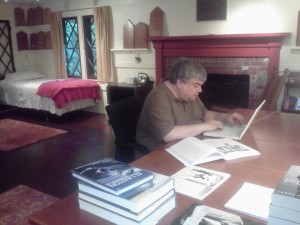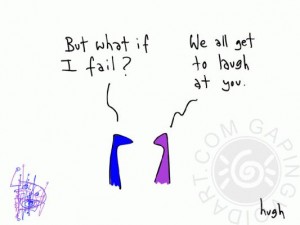Thanks to Maria Popova, this “kinetic typography” video, in which Ira Glass talks about the problem of creativity, has been making the rounds for some time now:
I only just caught up with it, and thought the text worth transcribing for those who prefer to digest such things through the eye rather than the ear:
All of us who do creative work…we get into it because we have good taste. But it’s like there’s a gap—that for the first couple years that you’re making stuff, what you’re making isn’t so good, O.K.? It’s not that great. It’s trying to be good, it has ambition to be good, but it’s not quite that good. But your taste, the thing that got you into the game, your taste is still killer, and your taste is good enough that you can tell that what you’re making is kind of a disappointment to you. You know what I mean? A lot of people never get past that phase, and a lot of people, at that point they quit.
And the thing I would just like to say to you with all my heart is that most everybody I know who does interesting creative work, they went through a phase of years where they had really good taste and they could tell that what they were making wasn’t as good as they wanted it to be. They knew it fell short. It didn’t have the special thing that we wanted it to have….Everybody goes through that. And for you to go through it right now, if you’re just getting out of that phase, you’ve got to know that it’s totally normal, and that the most important possible thing you can do is do a lot of work. Do a huge volume of work. Put yourself on a deadline so that every week or every month you know you’re going to finish one story. Because it’s only by actually going through a volume of work that you’re actually going to catch up and close that gap, and the work you’re making will be as good as your ambitions.
While I think this is excellent advice to young people, my own experience is necessarily somewhat different, for the very good and very unusual reason that I didn’t start doing what Glass calls “creative work” until long after I had matured as a writer.
 I started writing the libretto for The Letter, my first operatic collaboration with Paul Moravec, in the summer of 2006, not long after I turned fifty. By then I’d been a professional writer for three decades—but outside of a single abortive attempt to write a play in 2002, a year or so before I became the drama critic of The Wall Street Journal, I’d never before tried to write anything for the stage. What’s more, The Letter was still the only thing I’d written for the stage when I started working on Satchmo at the Waldorf, my first play, in January of 2010.
I started writing the libretto for The Letter, my first operatic collaboration with Paul Moravec, in the summer of 2006, not long after I turned fifty. By then I’d been a professional writer for three decades—but outside of a single abortive attempt to write a play in 2002, a year or so before I became the drama critic of The Wall Street Journal, I’d never before tried to write anything for the stage. What’s more, The Letter was still the only thing I’d written for the stage when I started working on Satchmo at the Waldorf, my first play, in January of 2010.
As I’ve said before, it’s a mystery to me that I didn’t start doing creative work until my fiftieth birthday, and that my first two efforts were both successful. (For what it’s worth, I believe that meeting Mrs. T was what gave me the confidence to try my hand at something so unlikely.) Even more mysterious, though, is the fact that the first drafts of The Letter and Satchmo at the Waldorf came so easily to me. I wrote them very quickly: Satchmo took me less than a week to write. It felt as though I’d suddenly grown another arm.
 On the other hand, those first drafts were both subjected to months and months of painstaking revision, and in the case of Satchmo, I found it impossible to believe that a play whose first draft I had written so quickly could be any good. (I didn’t feel that way about The Letter, but that was because I was collaborating with an established composer who liked what I was doing.) So I sent Satchmo to a pair of professional stage directors whom I trusted to tell me the truth, both of whom said the same thing: It needs a lot of work, but you’ve definitely got something here. Don’t quit now. And I didn’t.
On the other hand, those first drafts were both subjected to months and months of painstaking revision, and in the case of Satchmo, I found it impossible to believe that a play whose first draft I had written so quickly could be any good. (I didn’t feel that way about The Letter, but that was because I was collaborating with an established composer who liked what I was doing.) So I sent Satchmo to a pair of professional stage directors whom I trusted to tell me the truth, both of whom said the same thing: It needs a lot of work, but you’ve definitely got something here. Don’t quit now. And I didn’t.
Only then did I come to grips with the hard truth of the theatrical axiom that plays aren’t written, they’re rewritten—and only then did Ira Glass’ words became fully relevant to my own experience. For the longer I worked on Satchmo, the more clearly I saw its flaws, and the more I doubted my ability to fix them. The only thing that kept me going was that once I’d spent a year polishing Satchmo, everyone who read the revised script wanted to produce it. Had I hit a blank wall of disapproval at that point, I probably would have succumbed to my nagging doubts and given up.
 All this leads me to believe that Ira Glass’ observations about the relationship between taste and creative inhibition are the answer to the question of why so few drama critics try to write plays. If you’re a competent critic, then you’re painfully conscious of the yawning gap between “good” and “pretty good.” That knowledge can’t help but be inhibiting—especially when you earn your living by sitting in public judgment on the creative work of other writers. I didn’t need anybody to tell me (though they did) that a lot of people in the theater business would overflow with schadenfreude if Satchmo flopped.
All this leads me to believe that Ira Glass’ observations about the relationship between taste and creative inhibition are the answer to the question of why so few drama critics try to write plays. If you’re a competent critic, then you’re painfully conscious of the yawning gap between “good” and “pretty good.” That knowledge can’t help but be inhibiting—especially when you earn your living by sitting in public judgment on the creative work of other writers. I didn’t need anybody to tell me (though they did) that a lot of people in the theater business would overflow with schadenfreude if Satchmo flopped.
So what did I do? I worked even harder to make it better. I listened closely to the advice of Gordon Edelstein and John Douglas Thompson, the director and star of the Shakespeare & Company production of Satchmo at the Waldorf, and took virtually all of it. Inch by inch the gap closed, and by the time the play reached New York, it was what I wanted it to be. My skill had finally caught up with my taste.
I assure you, by the way, that I’m not bragging. I’m simply describing my own experience in order to encourage other people to try doing what I did—even those who are as old as I was when I started writing The Letter. For the moral of my story is that while it’s important to be realistic, both about your own abilities and, more generally, the larger prospects for success in the world of art, it can be just as important not to let yourself be overwhelmed by that realism.
As W.H. Auden wrote in his libretto for Benjamin Britten’s Paul Bunyan:
But once in a while the odd thing happens,
Once in a while the dream comes true,
And the whole pattern of life is altered,
Once in a while the moon turns blue.
No matter how old you are, you’re bucking shockingly long odds when you set out to write an opera or play or novel. It probably won’t be any good, and even if it is, it probably won’t be good enough. At the same time, what they say about state lotteries is equally relevant to creative work: you can’t win if you don’t play. If you do decide to play, you’ll have to work really, really hard. But if you put in enough hours at your desk—and if you’re lucky—then there’s a chance, slim but real, that you’ll produce a work of art of which you can be justly proud.
